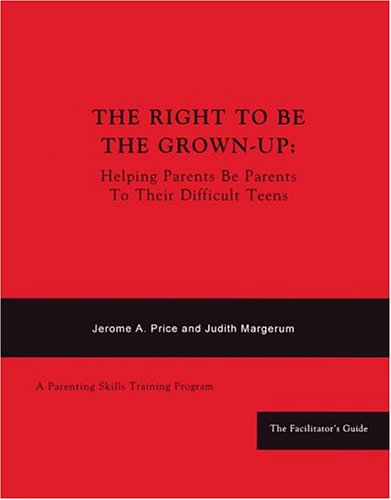
Jerome Price and Judith Margerum have joined forces to bring together an essential model for helping parents to help themselves as parents. Therapists will find here a host of practical, easy-to-implement strategies for working with parents to reclaim their lives when their children’s behavior is out of control. Each Right to Be the Grown-Up package comes with a “Facilitator’s Guide” and 6 copies of the “Parent Handbook.” The package is designed to be used in groups or when working alongside parents in a private therapy setting. (The authors also provide a series of parenting affirmations — or lifelines — on wallet-sized cards so that therapists can give them out to their clients.)
The Facilitator’s Guide is laid out into 5 sessions – Getting Started; Reactivity; Information; Coalitions/Teamwork; and Making It Work. Step-by-step guidance is provided on how to lead parents gently but determinedly through a series of learning modules, each of which will clarify parenting goals, instill hope, provide tools, and “unfuzzy” the boundaries that have faded over time. Practical exercises and support materials are offered throughout.
The Parent Handbook follows the sequence of the guide and offers a slew of helpful homework assignments, definitions, and mottos designed to reinforce the information presented there and to bolster parent confidence even at the toughest of times.
Developed by the Michigan Family Institute, this skills program has already met with great success through workshops and trainings based on it. Price and Margerum show what it looks like to move from theory to action when it comes to improving the lives of parents and their adolescent children.


